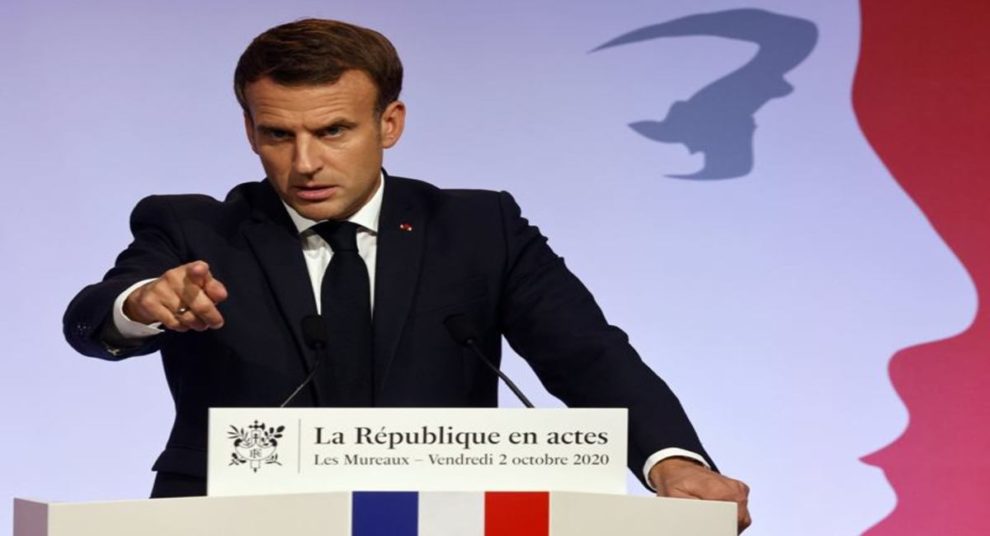France’s President Emmanuel Macron finally chose the main internal enemy of the French state: Islamic separatism. In the first three years of his mandate, the growth of radical Islam in France has presented itself as the biggest challenge to the government, which seeks to balance the fight against political Islam with a migratory policy strongly based on liberal and humanitarian values.
For President Macron, as well as for a large number of French politicians, naming the problem of radical Islamism was already the main challenge. For this reason, the president was cautious in naming the enemy he was aiming to fight with his new bill, choosing the term “counter-society”. But, when presenting his project, Macron made it very clear that he was referring to the fight against Islamic separatism, or, in other words, the domination of entire territories in the interior of France by Islamic extremist groups who want their autonomy in relation to the French State.
The fight against Islamic separatism has been left in the hands of judges and police, but from now on Emmanuel Macron wants to regain full state control through intense political action. The president believes that the situation has been treated with negligence and that it needs to become an agenda of extreme importance for national security. A recent study indicated that 74% of French Muslims under the age of 25 respect the precepts of Islam above French republican laws. 45% in the same age group consider Islam to be incompatible with the values of the French society. In general, these groups come together in family or ethnic communities and form large areas occupied exclusively by Muslims, considerably increasing the risks of social tensions and conflicts with the state.
These data should serve to alert any politician in France, a society where secularism, liberalism and humanitarianism are some of the main bases of the coexistence between citizens. But, on the other hand, what has been seen so far is an exaggerated, enlarged and caricatured version of European humanitarianism, which is characterized by allowing everything in the name of the unrestricted defense of freedoms. As a result, extremist ideas grow absolutely contrary to such freedoms and the very existence of the French democratic structure is under threat.
The “reconquest crusade” announced by Macron will also have an effect on the school education of French children. The president proposes compulsory schooling from 3 years old, except for health reasons. Family education, then, is over. At the same time, vigilance over clandestine Islamic schools that flourish in every community in France – and have alarmed non-Islamic neighborhoods, which, however, do not report in fear of retaliatory attacks – will be intensified. Depriving children of the French educational system is one of the main goals of radical political Islamism that is growing overwhelmingly in the country.
In several regions of France, local politicians have grown due to the partnership with Islamic communities. Benefits have been provided to Muslim communities with an interest in political support. Public schools, for example, have adapted their lunch menus to meal options according to Islamic law, due to agreements made by local politicians with Muslims in exchange for votes during election periods. Macron fears the advance of the Islamic “entryism”, which spreads as links are established between French politicians and Islamic leaders. In some French cities, public bus drivers can reject women who they consider to be dressed “indecently”. The new law will be extremely strict against these attitudes and the rule will be extended to private transport companies hired by the municipalities – no company will tolerate religious exceptions in its operations.
This reactionary turn by Macron is simply curious, especially when we think that the current French president was elected exactly by fighting Marine Le Pen’s speech in 2017, which was focused precisely on the Islamic issue. Macron and his supporters have always condemned the speech against Muslims and reinforced humanitarian and liberal policies, and now, on the contrary, they are acting in favor of such policies to combat the influence of a “foreign culture” in French territory.
One point, however, remains uncertain: what will be the future of migration policies? The mass migration that France has allowed in recent years was responsible for the spread of Islam in the country and for the creation of semi-autonomous communities that seek to emancipate themselves from the French state. Macron intends to combat the consequence, but apparently remains inert about the cause of the problem. It is possible that the French president is simply waiting for the approval of the current bill to later propose something more rigid about migration. But it is also possible that he wants to simultaneously please the most conservative wings of the country, fighting political Islam, and the high businessmen, interested in the cheap labor of immigrants. This second possibility is not a reasonable hypothesis and will only damage Macron’s image, in addition to not solving the problem of separatism.
Contributed By Lucas Leiroz, a research fellow in international law at the Federal University of Rio de Janeiro.
